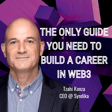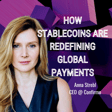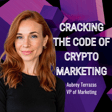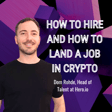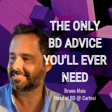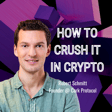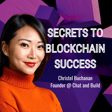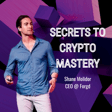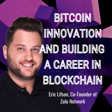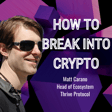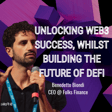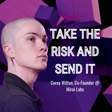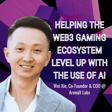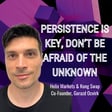Introduction to Stephen and Multisig Labs
00:00:00
Speaker
Stephen, welcome to the show. How are you? I'm doing great. Thanks for having me. No worries. Thanks. ah Thanks for joining me. Stephen, for people who don't know who you are, could you give us bit of an introduction, please?
00:00:13
Speaker
Yeah, so I co-founded Multisig Labs with my partner, Johnny Galt. And then notably about two and a half years ago, we started working at the Avalanche ecosystem to create a staking protocol called Gogopool, who now runs about 33% of the validator nodes on the Avalanche network, has over $40 million dollars in TVL.
00:00:33
Speaker
And its entire mission and express intent is to help bootstrap the validator sets for new L1 blockchain deployments. Nice, sounds exciting.
00:00:44
Speaker
And we'll ah i I've got a bunch of questions to ask you about that in in just a
Stephen's Career Journey
00:00:49
Speaker
sec. But could you take us back to the very start of your career, talk us through the journey that's led you to this point?
00:00:57
Speaker
Yeah, for sure. So I have been in entrepreneurship since, you know, since high school. And then during college was kind of the big decision of do I go into academia or do i ah you know, go for it, go and go make startups.
00:01:14
Speaker
um So then through college, i I was in applied math and then did a ton of computer science, a ton of computer engineering. So definitely classically trained as a developer.
00:01:24
Speaker
um And then through that experience in college, got exposed to a whole startup scene, went to these coding competitions around the US called hackathons. And that's where I got my first kind of like angel check, actually, was at the end of the last hackathon.
00:01:36
Speaker
So that sort of inspired me and my buddy at the time. We're like, all right, let's let's fucking go for it. So we raised a small angel round bootstrapped start up for three years i' doing AI video interviewing tooling tooling for really large HR companies and staffing agencies.
00:01:55
Speaker
And then from there, got into crypto because we were always really obsessed with open source code, always represented kind of like the true essence of like enterprise and entrepreneurship.
00:02:09
Speaker
you know, opportunity. So Web3, when i was we were pivoting that first startup into this ai video editing tooling for content creators, we want to create new business models using blockchain through that was applying to Y Combinator.
00:02:21
Speaker
And then through the YC application process really went down the rabbit hole of blockchain and what it means. We discovered, holy shit, this is one big open source kind of conglomerate.
00:02:34
Speaker
There's a bunch of open source code that can Lego block into each other and can all interoperate using smart contracts and Solidity guaranteed by the blockchain. So that really took us down the the rabbit hole hole of Web3, I would say.
Mission and Challenges of Gogopool
00:02:48
Speaker
And from there is when we decided, all right, it's actually insane to us that no one can deploy L1 blockchain. You have to raise hundreds of billions of dollars to do that today. So with the mission and what we saw at a blockchain was a modern way of doing business where it can streamline a lot of things. It's a new type of database, creates brand new customer experiences.
00:03:08
Speaker
But so far in crypto, the killer app has been financial applications ah like for the capital markets. But what drew me to it was always the idea of, can I apply blockchain too new innovative problems in the world to really move the needle in different areas of the world?
00:03:23
Speaker
So. so We pivoted into Google pool alongside that mission and then raised a big seed round and like a seed extension round, launched the token or launched the protocol about a year and a half ago. And here we are. Nice. What's it like being part of something like YC Combinator?
00:03:45
Speaker
Um, so through the application process, I actually pivoted out of it. So I, I didn't end up going into Y Combinator because, well, there's a bunch of reasons why, but, uh, made more sense just too raise a round and like go for yourself rather than being a part of an accelerator.
00:04:02
Speaker
Fair enough. Fair enough. And, uh, did you always know by the sound of it, you, you did, but did you always know that you wanted it to be an entrepreneur? I, what, what kind of took you down that, that route rather than the,
00:04:15
Speaker
Let's get a job. And, you know, I never thought of it. I never knew what went into the label of an entrepreneur or doing a startup. Like, I never understood really what those characteristics are until now. And I'm like six years into the game and I can like, OK, here are the attributes. Here's what makes sense, et cetera.
00:04:32
Speaker
um But definitely looking back on it, my trajectory and kind of my personality type was definitely always taking me towards more ah kind of risk on ventures.
00:04:44
Speaker
Like, I think that's for sure. Like, as far as I can always remember, I'm always, I've always been doing something interesting, um something more opportunistic. Nice.
Thriving in Web3 Industry
00:04:56
Speaker
And you think that, ah that part, that taking risk part, that's obviously a massive, ah it's a massive of attribute that you have to have, I guess, if you're looking to launch a startup and looking to go into especially in web 3 as well it is a risk right it's a growing industry that uh needs to take hold i guess in in the more traditional uh world but um yeah you think that that risk has obviously played a huge part in in where you are now um anything else that really comes to mind that thinks you know if i didn't develop this attribute or i didn't have this personality type i probably wouldn't have launched
00:05:31
Speaker
The company that stands out to me, like a kind of a learning is like, you've got to be really comfortable drinking from a faucet of information.
00:05:43
Speaker
Like the rate of information flow is quite incredible. And just by nature of doing a startup, you're entering, you're probably entering a relatively new domain. so actually for me as a young person, like I'm 22, what experience do I have in recruiting?
00:05:56
Speaker
Right? So for me to jump into the recruiting industry, It was like a solid 12 months of just complete immersion and visiting the local recruiters and the staffing agencies and HR shops near me, like doing video interviews with everybody, like really getting into it.
00:06:12
Speaker
um And then, yeah, i both of think the same as this also probably suits my personality as well, but definitely very mission driven. So once I see the world as it should be, I think it's like that's the North Star.
00:06:25
Speaker
know what mean? So I think like it definitely takes a level of focus and just being able to like stand in a freaking waterfall of information, try to metabolize faster than all your competitors and try to metabolize faster than and the rest of it industry. industry Yeah, it's a tricky skill, especially in Web3 as well.
00:06:45
Speaker
I mean, you spend long enough on crypto Twitter and you get down a rabbit hole of all sorts of stuff. It's a bit of a mess sometimes. Completely impossible. The only tactic I have for Web3 is I actually...
00:06:58
Speaker
I started this a while ago, but um i actually just don't read any news and I barely read Twitter. And then what my tactic has been is I just have a really good circle around me.
00:07:10
Speaker
So when something does happen, like XRP does a 5X or something like in the last 25 days, like I hear about it. You know what I mean? So I definitely rely on my social network because people float things just all the time because it's always interesting. And everyone's always put information faucet.
00:07:25
Speaker
um But I just think it's it's completely impossible to keep up with crypto. There's just no way. was having interesting conversation the other day um from someone who's who's super well connected in Web3 and been successful on on a number of projects. and And he was saying that actually your network is everything in Web3 to really understand what's going on in the industry and to really help you thrive in Web3 as an industry.
00:07:52
Speaker
ah Your network is key. Like who you surround yourself with, the types of information that ah that you can help each other out with and and and stuff. It's quite a... It's quite an unusual thing, really. It doesn't really work like that in Web 2. Like, no one shares information quite as much as they do in Web 3.
00:08:09
Speaker
um but I think that's true. I think there's some truth to that. I think in Web 2, though, like, you know, your your network is your net worth and all that. um But I just think Web 3 and also AI, like, these are these are the two most competitive industries in the world right now.
00:08:25
Speaker
Like, there is no other two more prosperous industries where a person can, can like, get started and you know, really make their way with it. um And i think in industries like this, it's definitely like, man, everyone is looking for an edge,
Startup Lifestyle and Work Approach
00:08:39
Speaker
right? If you can just keep helping people, people start helping you.
00:08:42
Speaker
I think that's where that's kind of like the the root principle there. But because it definitely like in recruiting, and or even the content creator business, also growing industry, but not nearly as fast growing as Web3.
00:08:57
Speaker
So even like the slower the industry is to a certain extent, the slower the rate of information is as well. So there's not as much working together because you kind of don't, thank cut people aren't really incentivized to do that.
00:09:08
Speaker
But in Web3 and these are the two industries, man, where if you can, You know, if you can work really hard, you're really smart and you're really passionate about what you're doing ah for a long period of time, four or five, eight, 10 years.
00:09:21
Speaker
and Like you can definitely move mountains though. Like the whole industry is still being defined, you know, best idea wins. Yeah, you're right. How did you find working with recruiters and diving into that industry?
00:09:33
Speaker
I liked some of them. Some of them are really good. umve got ah I've learned so much about salesmanship from my time DeepPyre. It's just one of my personal edges coming into crypto where everyone is all, oh, maybe something will happen. Let me send a DM to somebody and maybe I'll get a call, you know, or maybe I'll be able to show them a demo or pitch them.
00:09:54
Speaker
But versus in recruiting, it's like definitely the best salespeople, also the worst salespeople. They got the whole spectrum. Yeah. But I've learned a lot about what it takes to build a real business that has actual cash flow that you can build just by smiling and dialing.
00:10:11
Speaker
Right. To a certain extent, you play that formula and you can build yourself a nice recruiting business. I think crypto could use us more of that. chemical yeah Crypto right now is very ah speculative premium is really, really high still on crypto.
00:10:27
Speaker
For sure. Yeah, recruitment is definitely full of some characters. That's for sure. The recruitment industry. For sure. Yeah, it's an interesting place and Stephen, could you ah could you talk us through what, this is going to be quite a vague question, I think, but could you talk us through what a day in the life of a co-founder ah looks like? I know that is super vague, but I think both research and entrepreneurial industry, right? And most people I talk to, I'd i'd say three quarters of people I talk to would love to start and run their own projects one day.
00:11:02
Speaker
Um, uh, But I don't know i don't know if they that many people really understand the stresses or like what it takes to be a co-founder and like the stuff that you actually have to do that you maybe didn't think that you'd be getting involved in and this kind of stuff.
00:11:18
Speaker
Could you just paint a picture of like bought what it means to be a co-founder or what a day in the life of a co-founder looks like? Um, yeah, I can preface a little bit too. And I can open up my calendar. just talking about like today and tomorrow or even like Friday.
00:11:33
Speaker
But I think definitely a lot like being a founder is so glamorized, man. um I definitely don't think most people should be. I don't think three quarters of people you talk to should be founders. If that makes sense. Doesn't mean they shouldn't try, but like to do it, you know, man, that's a 10 to 20 year game.
00:11:52
Speaker
I think most people just aren't ready for that level of, dedication and hard work and rigor. um But there's definitely like upsides to it too. I mean, the the independence and freedom is completely unparalleled if you're good at what you do, right? If you don't have a prosperous startup business and you don't have investors and you know, you don't have a good network and you're not like in something that's growing, then very tough. Like for DeepHire, that first startup the last year, like around COVID 12 months during COVID.
00:12:20
Speaker
I mean, I was just brutal, man. I was getting three to four hours of sleep. um And then for a stretch of a month and a half, it was three to four hours of sleep per week. Like it was just insane trying to keep the lights on during COVID when the whole, like, cause I don't know if you were doing recruiting back then, but the whole industry, 80, 90% shut down and within the first month. um So that's tough.
00:12:44
Speaker
so that's the the downside of being a founder, but I guess the average day of a life to like, for me right now is I'm talking to you after this, doing a fundraising standup after that, have a sales standup.
00:12:57
Speaker
After that, one of our bigger BD deals after that doing, uh, like PR planning and media planning or reviewing progress for last week, then a couple more BD calls that I'm flying to Miami for this conference.
00:13:13
Speaker
So, and then through all this, I'll be on telegram and slack and signal, giving people, I respond to questions, asking people questions, double checking on things. Um,
00:13:24
Speaker
like looking at the Twitter post people send me, like DMing, doing some high value outbound. ah So I'd say it's pretty sporadic, but the only constant thing is every morning I have my routine, every night I have my routine, and then a piece of my morning we routine, this is set, what are the three things that need to get done today just to move the ball forward?
00:13:43
Speaker
um Outside of that, I think it's, largely my day is largely dictated by what the business needs and where are we trying to push, you know, like for two weeks, I was extremely deep into product and two weeks, extremely deep into BD.
00:13:59
Speaker
Right. I can, can shift around pretty, pretty, pretty quickly. Do you tend to find that it happens like that? So rather than it being ah small parts of everything all at once, it's right. What needs the most attention? i'm going to put my time into that.
00:14:14
Speaker
Do you flick between it in almost sprints in that kind of way? Or do you just think that that just happened to work out like that, that those particular weeks?
Crypto Business Models and Strategy
00:14:25
Speaker
don't know what other people do.
00:14:27
Speaker
But for me, I'm definitely like a lion. It's like hardcore sprint for two, three days, even for like one hour. and do like these one hour long work sessions.
00:14:40
Speaker
um And then there are periods of time where I'm just... um playing a video game, I'm laying on the couch staring at the ceiling, like I'm just thinking about stuff I'm writing, I'm walking outside, like I'm just not doing anything, I'm being like the laziest person ever.
00:14:56
Speaker
ah But knowing Like I think in this game, especially in crypto, actually specifically for crypto, the business model of crypto is so cyclical, so macro driven. Like right now we're in upcycle.
00:15:07
Speaker
So now's the time to get the deals done. Now's the time to push everything forward. Now's the time to do that fundraising i you've been thinking of. and Now's the time to like everything you've been working on before. It's like, all right, make everything public facing, make as much noise as possible. like Let's fucking go.
00:15:20
Speaker
Um, you know, let's commercialize, but for the past, would you say like 12 months, I would say maybe, guess like Q1 had a little bit of a pop, uh, and Q4 last year also a bit of a pop, but like everyone could tell, at least most people could tell it wasn't an extended thing. There's no, there's no like fundamental driven, uh, kind movement around it.
00:15:42
Speaker
So it's like, you know, you had like three months of hard work there, but um In these like down cycles, I think it's really important to just be very intentional. I think most people don't think enough about what they should be working on.
00:15:57
Speaker
Most people just react and they do and they're doom scrolling Twitter. They see, oh, AI agents are popping off right now. or's What's my AI play? What's my AI strategy? You know, but I think that's, that's a trap, you meaningful work doesn't actually get done.
00:16:11
Speaker
You know, like it takes, took Elon, what, seven years to launch a rocket to space successfully, you know, like that doesn't happen if he's footing around every time.
00:16:22
Speaker
Yeah, that's fair. So yeah, have a have a plan and then execute it, I guess, not get sidetracked by all these different things that happening. Yeah. And just be like, if there's any universal advice is just be present, be as mindful as you can all the time, because the plan changes quickly just based off what's happening.
00:16:42
Speaker
Right. It's like the, the, you're in the middle of an ocean and there waves going everywhere and you just gotta stay above it and spot the opportunities. Like where do I, where do I submarine it? Where do I dig in? Where do I direct all my attention and focus? What's the opportunity?
00:16:54
Speaker
For sure. And could you, could you talk us through your goals when you started Multisig Labs? Did you have that yeah that idea in mind, like that intention, that focus when you first launched? So when I started Multisig Labs before launch, the absolutely the mission, the North Star was to create a modern way of doing business, like enable all these Web2 companies, Web2 startups to use blockchain, use Web3 to enhance their their offerings, do something novel.
00:17:24
Speaker
um So when we actually went to launch Google pool, the first protocol. Um, then it was very, we launched in ah a bad market. It was ah FTX crashed. Luna had crashed three months after that. And four months after that, we launched our token and launched a protocol and started getting TBL and the first value.
00:17:44
Speaker
So it was pretty, ah small and compounding growth for the first, don't know, six months, I think. April 23, start with 23. thought twenty three what time was it I think so. but It's been about a year and a half.
00:18:01
Speaker
Oh, there's another thing about the life of a founder. dude my I don't know if this is other people are just me, but my sense of time is completely gone. think in terms of 90-day cycles and seven-day cycles.
00:18:12
Speaker
So it was probably about six quarters ago launched a role. Yeah. ah
00:18:19
Speaker
Yes, I think that was because I think, ah yeah, FTX, well, Luna happened, then FTX happened. That was just as I'd launched Unveil, the recruitment business, actually. So I think at that point, I was thinking, cool, yeah, what am I doing? Why have I done this?
00:18:34
Speaker
a lot of people that became unemployed. so Yeah, true. Yeah. True. A lot of people looking for work, not so many projects hiring at that point, which is the the tricky thing.
00:18:44
Speaker
but um But yeah, I know what you mean. It was a yeah fairly testing very testing time, I guess. i guess Yeah, it was definitely testing time. And then you had the whole, don't know how much you follow US s politics, but you had the whole Elizabeth Warren kind of anti-crypto army, so Silicon Valley Bank collapsing, like all this regulatory pressure just coming out of seemingly nowhere, attacking fintech and crypto, which I guess now is coming more to lay all this debanking stuff that's been happening.
00:19:13
Speaker
um So it was definitely like a spooky time. It was definitely challenging. But what we really learned out of it was to get extremely focused. like talk I guess I've been talking a lot about
Learning and Mentorship
00:19:24
Speaker
focus right now with you, but ah getting really, really focused on making sure what you're building is an actual people want Like, does this token actually fulfill utility?
00:19:31
Speaker
You're actually solving the problem for people. What are the blockers to making this thing grow humongous? That's where I spend a lot of my extra cycle, like mental cycles thinking about. But during that time, like that was, it was good. and Like now it's getting really noisy.
00:19:46
Speaker
i don't know how it is for you and your business, but for me and mine, like, dude, I'm getting hit up. Maybe every day, like, Steven, what's your AI agent place? Steven, are you launching in some a agent thing? Steven, check this out. Steven, what are you guys doing with that? Like, have you seen this? I mean, look at Ripple, you know, look at Slot. Like, where's your meme coin launch pad? Maybe you should do one for L1s.
00:20:02
Speaker
You know, there's all sorts of ideas. And in a bull run, everyone seems like a genius because everything seems to always work and everything seems to be an overnight success. um But like definitely during, like, I kind of miss it a little bit, maybe in like a Stockholm syndrome way, but during the bear market, it was...
00:20:20
Speaker
It was very focused. There nothing else to do. And you also had to, to survive and make sure you're actually being decentralized. You're actually creating utility. You're actually creating genuine customers, uh, or like solving a problem that people have.
00:20:33
Speaker
And then you can like monetize or commercialize it in some way. So it's been, it's been a lot of fun so far. We've learning a ton. was going to say, how do you, how do you learn how to dive into all those topics?
00:20:45
Speaker
that's quite varied. We've got to learn marketing and products and the tech side of it. and obviously Yeah. forget food Security, decentralization, capital markets.
00:20:56
Speaker
Capital markets branches down to like four different things when you think about launching a token or how to make a, how to like reach an audience with your tokens so people actually use it. Sales, BD, ah hiring, recruiting.
00:21:09
Speaker
Yeah, forget about it. It's, I don't know, how do I learn about it? you yeah guess I just dive in and incrementally, right? Like, okay, I've got to hire, had to hire the best head of ecosystem I could find.
00:21:21
Speaker
This was like 30 days ago. It was like, that was my only focus for about a week. It's like, all right, what what should i look for? What do I need? What gaps do i have on the team? Who do I know? me hit up all these people. um But I think, yeah, not to say i was my only, only focus. I think I probably like two other initiatives at the time, but there was like 80% of my attention was on that.
00:21:42
Speaker
that's Yeah, because I think, again, like being able to learn all these skills is key to success, right? as a As a co-founder, as a founder of a project. Yeah, you can start to build a team around you ah and start to offload some of these tasks and responsibilities onto those guys. But in the end of it, and the responsibility sits with you and you have to know about the things that your team are ah doing and building and stuff, right? You can't rely on others all the time.
00:22:06
Speaker
So yeah, I think that's quite a key ah key thing is people to understand this is either how they can do it or where they can go. Is it just trial and error? you Do you reach out to mentors and ask their advice and that kind of stuff? Is there anything that particularly stands out to you? Or do you think it was just trial and error getting stuck in and necessity forces you to learn it?
00:22:28
Speaker
That's a good question. What does it look like when I dive into something new? um It's a lot of energy. I throw a ton of energy at it and just don't give up. Never, ever give up. Building momentum, I focus a lot on creating momentum.
00:22:41
Speaker
Momentum is probably the biggest lever I have. So how that gets applied here is I'm diving in and got to hire someone. How do I hire? What interview questions do I ask? like How do I set everything up? um And it's just little tiny things like in 15 minute chunks, try and learn about different concepts, how have other people done it.
00:22:57
Speaker
I hit up my co-founder who's hired 2000 people in his previous enterprises, like asking him, right? Like looking for mentors, just it's really looking at whatever resources I have around me. like take a quick stock 15 minutes, what I have around me with what cards I have in my hand and then just get in then go and deploy that tactic or whatever.
00:23:18
Speaker
um And I through that never expect that one things a silver bullet. So i would say it never is. um But knowing that things will take like four times longer probably than you think, or do you think it'll take you maybe four days to get really good at tokenomics?
00:23:34
Speaker
probably playing for 16 days, 20 days. You know, if you take, if you think it'll take like two weeks to fundraise, playing for eight weeks, I think that's that high level heuristic has held true.
00:23:45
Speaker
And then just building that momentum of what resources do I have? How do i get more resources? How do i ah how do I use the resources effectively to learn? For sure. That's good advice.
00:23:56
Speaker
And is there anything that you could make people aware of before ah launching our own project? i want to but to found say Say someone ah comes to you and says, right, I'm launching, or I want to launch a product or project in this particular area of the industry.
00:24:10
Speaker
ah What advice you have for me? What do I need to be aware of? Again, probably quite a vague question. um But is there anything that really jumps out to you? Maybe stuff that surprised you, perhaps. um Um, I would say one thing, so I'm not a capital markets guy. not a trader.
00:24:29
Speaker
Like I don't, I hold three tokens. You know what mean? Like I just don't trade. It's just not me. I'm very much a product guy, classic kind of web to kind Silicon Valley style of training of building things.
00:24:41
Speaker
um And so I've learned one thing that was surprising to me I've learned, love two guys try to like hit on this idea, but I've learned a lot from my trader friends now in crypto.
00:24:52
Speaker
ah The idea of like having an edge, like you're going to make a trade, you can do something like what's your specific edge? Why are you going to spend time in the bear chain ecosystem? Like, do you know someone? Do you know something people don't? Like, why ah this make sense for you? There's so many opportunities.
00:25:05
Speaker
I would say the same thing to people thinking about starting a company is to really think critically and test your edge. It's okay, you want to like build a DeFi app so that will compete with Aave.
00:25:17
Speaker
It's like, okay, well what do you got? you know Do you have like a best friend who's the previous co-founder of Aave or something? um Are you an expert in it? Someone you know an expert?
00:25:29
Speaker
Do you know how to get TVL really quickly? Do you understand the levers of the business in a way somebody doesn't? Do you have some experience you can innovate on and remix to apply it to the borrow-lend kind of market?
00:25:41
Speaker
So I think this idea of having an edge is really
Multisig Labs Ecosystem Strategy
00:25:44
Speaker
important. It's not something i wish I respected it more and with DeepPire. So with DeepPire, we are this first recruiting company. We like, all right, we're doing a startup.
00:25:53
Speaker
We looked at the numbers of what's a really big market that's growing pragmatically. And there's lot of customers and we can fail and kind of iterate many, many times very, very quickly because we're not going to burn through 10 customers if there's only 10 people in the market.
00:26:08
Speaker
yeah um But the idea of this edge, like we didn't have an edge, so it took us a year to build the edge, I would say. ah because so that was yeah it's Definitely respect respect the need for an edge.
00:26:19
Speaker
And then people call it founder market fit. like As a founder, are you a good fit for the market? you know is Are you the type of person who can bring in this market with this product for this problem or opportunity space?
00:26:30
Speaker
like Are you specifically uniquely qualified for that somehow? I would say that's something that wish I respected a little bit more and I would definitely encourage to other people as well to kind of like go through that exercise.
00:26:43
Speaker
I like that. That's a good way of, like that explanation. The founder market fit. I never thought about it like that before. About how you need to actually work out if you're a good fit for that market, you might have the best product in the world, but if you're not the best person to build that business or sell into that market or build that network and build those connections then, then yeah, maybe it won't work.
00:27:04
Speaker
You think that's a rule? But just plan for a solid 12 to 18 months of developing that founder market fit, you know?
00:27:14
Speaker
So then if you really care about the problem, you're willing to invest 12, 18 months into it, then like, yeah, man. believe to you, go for it, cheer you on. But it's definitely non-trivial.
00:27:26
Speaker
and now In those 12 to 18 months for something that you're uniquely qualified for, you could have built a unicorn in crypto. you know You could have had three IPOs in that timeframe. yeah Yeah. what What was your edge when you started Multisig?
00:27:41
Speaker
I think I understand open source code really, really well. i What motivates people to use really existing, really big systems. I think that's a really big problem right now in crypto is that you have a humongous thing like Solana and Solana is a siloed off ecosystem.
00:27:55
Speaker
There's zero incentive for someone like a Monad or BearChain to do anything with the Solana ecosystem other than a vampire attack. Like, I think that's just, that shouldn't be the way crypto works because crypto is already all this Lego blocky permissionless kind of smart contract protocols that can fit together and interoperate permissionlessly.
00:28:15
Speaker
But yet these ecosystems aren't modular. You can't have Solana work with Monad or with Avalanche. It's just, they They view it as PVP and competitive. ah So I think my edge in starting multi-sig is understanding what those ecosystem dynamics are.
00:28:30
Speaker
And we're running this experiment right now inside of Avalanche where they're an L1 launching framework. So you can launch many, many L1s really quickly on Avalanche. But even in Avalanche, there's no incentive for these people to plug into each other, work with each other.
00:28:44
Speaker
um So we're running this first experiment, we'll start going live, Q1, Q2, of how do you like how to get these ecosystems to build off each other and get aligned so that they can share users, liquidity, and builders in a way that benefits everybody.
00:28:57
Speaker
um So that I think that's that's that's
Understanding Capital Markets in Web3
00:29:00
Speaker
our edge. That's what I'm really excited by. Nice. Are you able to share how how you're building that that mindset into the ecosystem that you're creating?
00:29:11
Speaker
Well, and crypto is a beautiful thing, man. It runs off of incentives. So it's going look like is a new protocol launch. It's a the new project that still keeps everything aligned with Google pool and everything that we've built and all our existing investors.
00:29:23
Speaker
But it's definitely a new protocol launch with a with an interesting incentive system. that will be modular and can fit into all these other ecosystems so so that every people can get sustainable sources of yield so that they can attract sustainable amount of users and builders over time versus their temporary grant programs but instagram and like the really huge air jobs that don't do anything.
00:29:46
Speaker
this is an alternative to these type of go to market strategies in a way that can start unifying and aggregating, connecting all these ecosystems. Interesting. And that's being launched Q1, Q2 next year.
00:29:58
Speaker
Has that got a set date yet of when you're announcing that and launching that? No, hopefully within, when is this airing? Do you know? That when, sorry, uh, this airing, uh, I would say two months, maybe six weeks.
00:30:16
Speaker
It'll be launched by then probably. Yeah. Or at least announced and yeah. nice That's pretty, yeah. Yeah. Pretty soon. Mid-Jan. Yeah. the gin that's cool yeah we're busy man that's why we're going to miami how is it you you're heading there to talk about the protocol and erasing on that protocol at moment yeah yeah yeah okay nice well then any just to go along with ah with that uh with the edge are there any challenges that really surprised you throughout your journey in in web3 like launching the company in the industry and launching projects and stuff
00:30:54
Speaker
I think challenges are the biggest challenge by far is the information information asymmetry that happens when you're a founder, like a really good product founder, like Silicon Valley again, like hearkening to of the classic kind of view of a founder.
00:31:13
Speaker
um And then now you're launching ah protocol in crypto, which is extremely capital markets driven. and So the the capital markets are running crypto still today.
00:31:27
Speaker
And I think as a founder, when you launch a token, this whole supply chain of people who want to help you launch a token, but founders don't really understand. Oh, and I want you to. This is it has my actual customers, everyone is focused on like the product product market fit.
00:31:41
Speaker
But this token also has got a capital market fit. like Who's going to buy the token? Who's going to trade it? Why are they interested in the mission vision? like How do you build a community around this protocol and this idea that ah you think should exist in the world?
00:31:54
Speaker
um I think and then there's just a lot of misaligned actors that want to help you launch a token, but they're going to profit along the way. And you're probably not going to.
00:32:06
Speaker
So that was very challenging when we were thinking through how do I launch Google? How do I launch a GGP tokens? Okay, well shit. Turns out there's seven different vendors that I should probably work with ranging from legal market making, such as exchanges, launch pads, like auditors, like tokenomic advisors, other protocols, other partners.
00:32:25
Speaker
ah So it's definitely tough. um I think it's definitely tough in the beginning, especially if you just don't understand capital markets and how to think through an asset in a liquid market or trying to build a liquid market around an asset.
00:32:39
Speaker
And that's really tough to do, to create a market around something new, especially if you don't have any, you don't have an edge in it. You're able to give us a crash course on capital markets and what that means if someone has no no grounding whatsoever?
00:32:54
Speaker
Yeah, can I? So a capital market forms whenever people want to buy and sell something. So you think of like the Wall Street, Apple stock has its own capital market. Wall Street itself is a capital market. If you lumber, lumber is being shipped and exported all around the world.
00:33:09
Speaker
That's a capital market just because of people trading. It's like the the greatest human innovation is finance. You know, now there's a peaceful way to coordinate and incentivize people. Where previous to this global financial system, you know, you do a pointy sticks and sharp rocks and it can get very brutal.
00:33:27
Speaker
So finance is a beautiful thing. And capital markets is just a way of people trading something so they can coordinate and work with each other. And then there's all sorts of nooks and crannies where You know, people can build relatively large businesses out of a simple task of I'm in Russia and I want to move some oil over to Germany.
00:33:47
Speaker
And then it's like, okay, there's a lot of people involved in that. And each one each one of the steps in that supply chain usually has its own capital market. There are people trading the lumber used to build the pipes, people trading the yeah the welding companies who are used to actually create the pipe.
00:34:05
Speaker
There's people who are like, making a market around who's going to get chosen to build a pipe, right? So anywhere where people are trying to buy and sell and work together to achieve some sort of goal, that's a capital market.
00:34:16
Speaker
And then in crypto, you think of a financial market, you're not trading real assets or goods and services, you're just trading money around. So like Pendle, it's interest rate swapping. It's like, okay, this thing is going to give be 5% APY, this thing's going to be 10% But they're two different assets, two different risk profiles.
00:34:32
Speaker
So there should be a market where people can just like swap those interest rates really, really nicely. That's something that Pendle solves. And then you can sort of like DeFi enables more unique, more use cases, more unique use cases around creating capital markets.
00:34:47
Speaker
that So that's why it's really interesting. And launching a token is its own capital market. It's like, why why is XRP doing what it's doing? Why is Cardano, the ADA token doing what it's doing? and That's its own game. That's its own capital market right there.
00:35:01
Speaker
As a founder, do you need to, as a founder in Web3 specifically, do you need to know about capital markets? Do you think there's ever a time when you can launch a project without really understanding it? i dont I don't know.
00:35:13
Speaker
Well, the cryptos Web3's biggest killer app has been ah capital market, a permissionless global, always on capital market.
00:35:24
Speaker
So if you're launching something in blockchain without tapping into that or at least having a clear line of sight of how going to tap into this really weird, new novel primitive. Like, dude, i don't know what you're doing.
00:35:35
Speaker
You know, if you're trying to make a competitor Airbnb and you're trying to use a blockchain to do that, and you're not going to issue a token to with ah a way to incentivize capital markets to help the whole thing really scale.
00:35:46
Speaker
Like, dude, what the fuck are you doing? how are you going to compete with Airbnb? You know, like you're not. They have way more scale. But if have a token and a capital market, that's something Airbnb can never touch. You know, like that's that's a very serious differentiator that should be investigated very thoroughly.
00:36:03
Speaker
You should probably become an expert in the capital markets around kind of Airbnb lookalikes. That's cool. So as a, ah say if someone's listening to this and they're thinking, right, I want to launch ah project, they now know they need to understand capital markets. They need to find their product market fit and founder market fit over time.
00:36:24
Speaker
Anything else you think someone really needs to do or have around them to set their project up for success?
Co-Founder Dynamics and Storytelling
00:36:33
Speaker
um I think most things branch off of that. like If you have your edge, then you'll know, you know am I the guy with a nice smile firm handshake, or am I the guy with 10 fingers that can create amazing code?
00:36:47
Speaker
right So that in finding a partner to complement whatever skill set you have, definitely start there. It's really tough to do this, really tough to walk this journey for eight years as a solo founder.
00:36:57
Speaker
and I would not want to do that. That's really tough. Respect the people that do, but I just think it's ums tough. um And then, i mean, just getting at it, start iterating, start small, and really stay focused on what people want and try to stay very mindful through the whole process so you can always work on the highest leverage activities.
00:37:19
Speaker
I think maybe that's the third thing is spend a little bit more time thinking you should be doing than what you actually are doing.
00:37:27
Speaker
That's a good idea. So you can be proactive rather than reactive to stuff that's happening in the business. Oh, for sure. If you're a fully reactive, dude, you know, think of the founder of Cardano right now, not to write on them too much.
00:37:41
Speaker
But if he was a fully reactive person, if I were him, I'd be feeling like freaking God on earth right now. Right, but that's all it's all a social construct of a token price going up.
00:37:54
Speaker
And it's probably not very smart to feel extremely good when a stock price or a token price or a portfolio goes up, because you're gonna feel really, really, really bad when that thing inevitably comes down. You know, so it's probably way more worth it to just learn about capital markets and understand the first principles of what's going on.
00:38:15
Speaker
Good advice. How, uh, this might be quite tricky question. How'd you find a co-founder or how'd you pick a co-founder? Cause that's almost more difficult than choosing ah wife, husband, partner. do you know what I mean It's, that's a tough thing.
00:38:31
Speaker
Any advice? I found one, i would say for someone who doesn't know how to find one, i would say, all right, get really good at telling stories and trying to find one because if you can find a like the the skills you need to find a really good co-founder are the exact skills you need to then hire people, build a product, get customers, fundraise.
00:38:52
Speaker
It's the exact same storytelling ability. It's the exact same kind of like dog mentality and opportunistic mentality. i so It's the exact same thing. um So how I found one was i just knew that originally for Mosaic Labs for Google pool, I had about 80% of our system kind of proof concept to doubt.
00:39:10
Speaker
It's like actual code built and we're missing one kernel for it. And then i was just scrolling through GitHub. So I found my co-founder on GitHub. Turns out he was active on the Avalanche Discord.
00:39:20
Speaker
Turns out a week later, a really large Avalanche conference was happening. And then it just so turns out that hit him up a week before the conference. We hopped on a call.
00:39:31
Speaker
I was like, yo, I really like your code. I think it could be really useful. Here's what I'm working on. what are you up to? like Who are you as a person? um and then i was like, all right, like let's let's meet up at the conference. You plan to go to the conference? He's like, no. He's like, all right, yeah, me neither. But let's do it. And let's go meet the outreach community and see if we can work well together.
00:39:50
Speaker
So that's how I found my co-founder.
Breaking into the Web3 Industry
00:39:53
Speaker
That's lucky that you found him like that. Yeah, I mean, it's luck with the same first principles, right? Know how to tell a story and know what the opportunity is. Think really hard about what you need that you don't have.
00:40:03
Speaker
yeah Know where to look for it, right? It's the same. It's the exact same iterative loop, man. I can't stress that enough. It's the exact same loop as doing anything else. I've done that same loop 10,000 times now since we started the company.
00:40:18
Speaker
Yeah. Get really good at understanding that loop and implementing that loop. Yeah, for sure. For sure. And just practice all like if you're, if the person to do this is really intent on becoming a founder, i would just get obsessive about it.
00:40:32
Speaker
Like just practice the loop, you know, with your, with your significant other, like what do they need right now? Okay, let's test. Let's go. Let's tell a nice story about then see if they actually need it. All right, we're done now go to the park. What does that stranger need?
00:40:45
Speaker
Let's see, test, go out there, do it. You know, maybe all they need is a handshake. all they need is eye contact. Maybe all they need is hug or, Banana. I don't know. Just go figure it out.
00:40:57
Speaker
Nice. And what about if ah someone doesn't want to be a founder? ah They want to build a good career, successful career for themselves in the industry.
00:41:09
Speaker
um Any advice that you can share there on how you can maybe support founders in the industry or how you can set yourself up for success? mean, I think just solve problems.
00:41:20
Speaker
um that's That's the first principle. Solve problems in a very reliable way and with a good attitude. That's the first principle of how do you always become employable, and no matter what industry you're working in.
00:41:33
Speaker
um For crypto specifically, it's just all so open and permissionless. I would... And it also depends on your personal situation. Are you trying to make an income so you can have an apartment this month or are you trying to self actualize?
00:41:49
Speaker
Cause you've already made some money and now you're looking for more meaning in your life. Um, so you know, it can kind of get down, depends on the situation for that person, but, ah like there's, there's last 11 crypto, but yeah, the universal constant is just solve problems.
00:42:05
Speaker
Good attitude, be reliable and be a good teammate. Like, you know, help build other people up.
00:42:13
Speaker
have any advice, ah say if someone isn't in the industry yet, wants to get into the space. Say you were talking to a friend and they said, look, really want a job in Web3, where do I start? Any advice for someone to break into the industry?
00:42:26
Speaker
Because it can be quite difficult to get the experience working within a project without having worked in a project already. Because a lot of projects want people who've come from the industry already. And that's quite a difficult thing to do.
00:42:39
Speaker
ah to do really and to get. It's quite a difficult thing to find a project that are happy to take someone from web to and let them come across and give them that time to learn how the industry works. Any advice if you're going to talk to a friend about how they can get into the industry?
00:42:53
Speaker
If they're being very serious about it, i would say, oh that that's great. Let me help you. I've got two bits of advice for you. One is really under like really know who you're competing against for these jobs.
00:43:05
Speaker
I mean, you're competing against people who are so passionate Like we have people on my team, dude, they're, They just live in crypto. This is what they love. It's a blessing that able to work with them and they agree to work with me. right like there's like That's who this new person is competing with.
00:43:21
Speaker
um Someone who's on Twitter, not because it's a job, but because it's fun. and They're actually curious about what this latest you know remix of a Dex launch on fucking Solana is like. you know Or what is virtual actually doing now on base?
00:43:35
Speaker
like They're really into weeds because they just love this shit. um So that's the first thing. Then second thing is with that being said, I would say like follow your curiosity because only way to compete against that and the only way to have fun in this industry is if you start off with on your own curiosity.
00:43:51
Speaker
So for me, I was really interested in the when I got started, I was very interested in the um like the the root principles or the kernels of truth of why like what makes blockchain magical.
00:44:03
Speaker
Where is that magic? But then wanted to see that magic in a piece of code. So I would zoom in, I would start at the top of like, okay, I'm in MetaMask and I'm going to make a swap on Uniswap. So then what happens? All right, well, an RPC call happens and that goes to validator node, which then gets put into the block building process, which then gets submitted to the block.
00:44:19
Speaker
Like, oh okay, cool. But even through that, like who's running the smart contract code? Okay. Even deeper into that, who's compiling the smart contract code? All right. Deeper than that. Where in the EVM, where in geth or in areth is this actually have like what lines of code is running this stuff?
00:44:34
Speaker
um So that's what and then even the consensus, like, how does it talk to these other computers, how they work together. So to me, that was kind of my path was where I saw the magic. I was like oh, shit, this is really powerful stuff. And it's not hard to do. It's cheap.
00:44:48
Speaker
It's actually really, really cheap to run a blockchain. um People just don't know what they want, so it gets really bloated and then it becomes very expensive to run a blockchain. ah But it can become very, very cheap. like the The root components of it are dirt cheap.
00:45:03
Speaker
um And that's where I was like, oh my God, if if this this magic could be exposed to any entrepreneur in the world, any builder just like me in the world, like That's when we're going to start seeing some wild and crazy new things.
00:45:16
Speaker
ah That is genuinely net new. as much as a That's what's going to create the ChatGPT moment. As much as data analysis and kind of TensorFlow helped create ChatGPT today, once running deploying a blockchain is as cheap and easy as it was to do that with a private database.
00:45:32
Speaker
um We're going to see some wild
Opportunities in Crypto Industry
00:45:36
Speaker
new ChatGPT-like moments for crypto. So that's what really got me. And even now I'm like thinking back on it, like, oh my God, that was a glorious three weeks of my life where all I was doing was like talking to my friend, meeting up with him and like showing him the code. He would show me code and we'd just dive in really deep.
00:45:53
Speaker
But yeah, so I would, you know, to this person, I would say, know who you're competing against. And then two is follow your curiosity and have the follow through to really dig in. And then people will find you, honestly. And then the job will find you. It's really not that hard to get a job in crypto, I feel like.
00:46:08
Speaker
um It's just tough to be qualified, I think, in crypto. I think that's one of the beauties about the industry there, right? So if you're super passionate and you can show that you have that ability to learn and willingness to get stuck into it, then a lot of founders will give you the I give you the opportunity to work in roles that um there are perhaps people that may be more ah qualified from like a skills and experience perspective.
00:46:34
Speaker
The attitude towards the job plays a massive part in this industry. Huge. I hire people all the time. It's like, all right, this guy hasn't been in sales for six years. He doesn't really know much about sales, but my God, he's a dog that carries a medic.
00:46:48
Speaker
I've got a good smile. Like, and it's like very curious and actually wants to help people. But yeah, let's give him a shot. Give him a little project, give him some tokens, you know give him cash. Like, let's see what happens.
00:46:59
Speaker
I do that all the time, dude. All the time.
00:47:04
Speaker
That's good. That's one that's, yeah, as I said, like one of the things I love about the industry is you do have the ability to step into these roles. I think about it from a, even from a marketing ah perspective, right? I see CMOs who've only been marketers for two years, something like this, but they're just amazing and amazing at getting into the depths of how people in Web3 thinks. That's all they've known, for example. So they might think obviously a lot of Web3's marketing stuff is on Twitter. A lot of it's organic and this kind of stuff and KOLs and that side of it.
00:47:38
Speaker
ah Yeah, I look at it sometimes and think, oh, that's crazy. You're in that in these positions at such an early stage in your career where if you if someone who had been in a Web2 career for 20 years, then they might be like, right, I'm ready to make that step into that that CMO role or that Director of Engineering role or that VP role in Encrypto and Web3.
00:48:00
Speaker
People have been there for, only been there for two, three years, but they're able to step into these roles, right? some cool It's cool. Sure. Real, man. I mean, crypto, as we know, has been around since what, like early 2022, maybe mid mid to late 2021.
00:48:16
Speaker
So that means the most experienced person in the industry has got three to two and a half year head start.
Vision for Blockchain Business Ecosystem and Conclusion
00:48:24
Speaker
Yeah. Like that's not. It's not lot, really. Not a lot, man. You go in recruiting and you know this. When you in recruiting, you you know you're competing against people who have been doing this for 25 years. like They just have a different level of the network.
00:48:37
Speaker
They access a different opportunities. in crypto, that that sort of... This is the other thing that you just made me think of earlier of asking, like what advice would I give or what learnings I have is one, you can't... To to someone new starting out as a founder.
00:48:51
Speaker
So you have to really also respect, you can't cheat experience. You can't shortcut experience. So that dude who's been doing it, that woman who's been doing it for 25 years in recruiting, it's like, they're just gonna better than you.
00:49:02
Speaker
You're gonna have to accept that. Like there might be some opportunities of certain things you're better than they are. And, you know, maybe there's new AI tooling that can, you know, like speed up your process more than them. But net net, like they're just better at the game than you are.
00:49:14
Speaker
There's just no to overcome that. But in crypto, that doesn't exist. You know, like to your point, you get a CMO, it's been in the job for two years. It's like, okay,
00:49:25
Speaker
Like, dude, I like those odds. Like I'll, I'll compete against that any day. hundred percent. Yeah. Same. Um, what does the future hold that for you personally and also multi-sig you briefly touched on it. I've seen you protocol being launched in the new year, but long-term future.
00:49:42
Speaker
Have you got that in mind? Have you thought that far ahead? Well, Long term future it depends on how long we're talking, but I'm really addicted to this idea of creating a modern way of doing business for startups all of the world.
00:49:57
Speaker
Like, I just think if you're doing a startup today and you're not using a blockchain and thinking through a tokenized economy to kind of incentivize your PMF loops, use capital market fit as like a unique differentiator and use the properties of a blockchain to really differentiate your product. Like, I think you're just going to be so far behind in what, two years?
00:50:15
Speaker
And let's see what happens with this new administration, but things are looking bullish and regulatory clarity, et cetera, like operation 2.0, there probably shouldn't be a 3.0 happening. um So I would say it's like green pastures right now for builders coming into the space.
00:50:30
Speaker
And we see this every time, like, Trump's in office, regulatory clarity is coming, you know Bitcoin has risen. just There's massive surge of builders coming into crypto right now. Like a massive, that people on Twitter don't know about, because these people aren't tweeting, right? These people are, nose to the grindstone.
00:50:49
Speaker
What product am I going to ship in 120 days, 90 days? And they're really fucking good at what they do. So what I'm really addicted to is long term is if we can get the majority of the startups running through kind of Y Combinator programs or founder startups kind of programs, um then If we can get the majority of them to think of blockchain technology as a competing alternative to a private database, like a MongoDB, MySQL type thing, we're in a really good spot. That's what I'm going to upgrade that system so badly. Nice.
00:51:25
Speaker
So knowing what you know now about technology, leadership, entrepreneurship, growing teams, What advice ah would you have for your younger self if you go go back to the start of your journey before you launched the company, before you ah started on that journey?
00:51:43
Speaker
um I don't know if I would have listened to any advice back then, to be honest. Okay. ah I can't think of anything. and The only thing I think of is probably advice around mindfulness, meditation, like to treat mental health as important as physical health.
00:52:03
Speaker
So I grew up Western, very much Western kind of philosophy thinking. So, you know, especially this is what 2014, 2016, like mental health wasn't really thing. But would say that's,
00:52:14
Speaker
um but outsets You know, you got to have as much stamina with your mental as but as you do with the physical for this game. So I'd probably try to like just focus on that just to get one tiny win with me back then. ah But yeah, back then, I really don't think I'd have listened much advice.
00:52:34
Speaker
mean, maybe about fundraising, maybe I would have, but I don't know. Is that a bad answer? Not sure. that No, not so. No, not so.
00:52:46
Speaker
That's all good. But so Stephen, thank you very much for taking time to have a chat today. um Thanks for sharing your journey and and sharing your advice. um I think there's a lot there that people can take away and and implement, and ah hopefully they do listen to some advice if they're looking to get into the Web3 space.
00:53:04
Speaker
um But so if if anyone's interested, they want to find out more about Multisick Labs, about what you guys are doing, are they able to reach out on Twitter, you have communities on Telegram or Discord, anything like that that they can become a part of learn more?
00:53:18
Speaker
have communities on telegram discord probably the best way is twitter though stvngts that's me on twitter x.com slash steven gates without the vowels and then google pool with an underscore at the end of it google pool underscore on twitter those are the two best ways to reach me and to stay up to date about the company sounds great well um well yeah thank you very much for time and good luck at the conference i appreciate it man thanks taking the time with me

